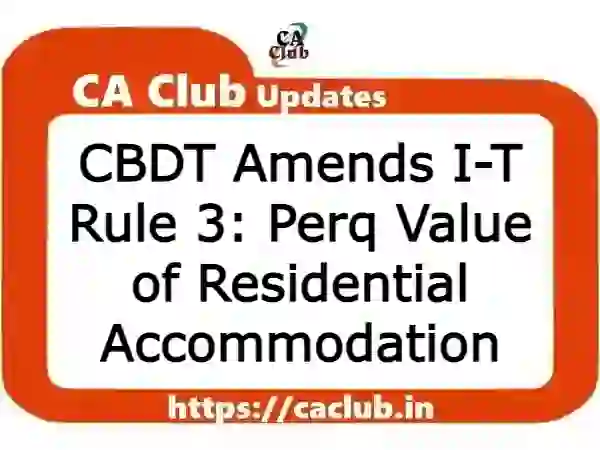The CBIC has notified comprehensive amendment to the I-T rule 3(1) concerning the perquisite valuation of the free/concessional residential accommodation provided by the employers to employees in different scenarios, effective from 1st of September, 2023, vide Notification 65/2023 dated 18/08/2023 (Income tax (Eighteenth Amendment) Rules, 2023), in line with amendments made by the Finance Act, 2023.
Significant Amendments to I-T Rule 3(1)
The modifications in I-T Rule 3(1) primarily deal with the value of residential accommodations provided by employers. Different scenarios of accommodation provision and its subsequent taxation have been addressed. The value of accommodation hinges on factors such as whether it’s furnished or unfurnished, whether it’s owned or leased by the employer, its location and the type of employer.
Tax Implications for Government Employees
For instances where housing accomodation is provided by the Central or State Government, the license fee, as determined by the respective government minus the rent paid by the employee, is applicable. If furnished, the perquisite value is increased by 10% per annum of the cost of furniture. If furniture is hired, actual hire charges apply.
Tax Implications for Private Sector or Other than Government Employees
In cases where accommodation is provided by other employers, different criteria apply, varying with the city population sizes. The value slabs are positioned at 10% of the salary in cities with a population exceeding 40 lakhs, 7.5% for populations between 15 to 40 lakhs, and 5% in other areas. Furnished accommodations attract an added 10% per annum of furniture cost or actual hire charges for hired furniture.
Temporary Accommodations: Lease Accommodation and Hotel Stays
Employer-leased accommodations subject the employee to a tax calculated on the lease amount, the actual amount payable by the employer, or 10% of the salary, whichever is lower. For employees provided with accommodation in a hotel for a period exceeding 15 days, tax is calculated based on 24% of salary for the relevant period or the actual hotel expense, whichever is lower.
Exceptions: Provisions for Deputation, Inflation and Remote Areas
The new amendment offers exceptions for accommodations provided at sites such as mining areas, onshore oil explorations, project execution sites, or an offshore site, as long as they do not exceed 1,000 square feet and are at least eight kilometres from any municipality or cantonment board. Multiple residential accommodations or those provided for over a year are dealt with special provisions, including the use of the Cost Inflation Index. The term ‘remote area’ is defined to exclude areas within or less than 30 km from a municipality or a cantonment board with a population of 100,000 or more.
CBDT Income Tax Notification 65/2023 dated 18/08/2023: I-T Rule 3 Amended (Perq Value of Residential Accommodation)
CBDT Income Tax Notification 72/2023 dated 29/08/2023: Corrigendum to Notification 65/2023 dated 18/08/2023
Conclusion
With the introduction of this amendment in the Income-tax Rules, 1962, the taxation rules have changed significantly for employees in India receiving accommodation as part of their job perks. To ensure proper adherence to these new rules, employees and employers should familiarise themselves with these changes. It is particularly crucial for employees and employers who deal with accommodation benefits to understand and comply properly with these new rules.
